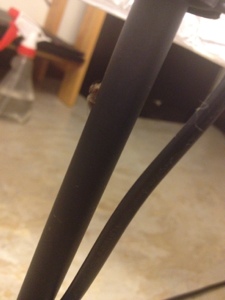Once, I was dancing salsa with someone who suddenly stopped mid-song.
“Are you dancing with the rock-step on one or on two?”
“On one, generally, but I’m not too concerned about it.”
We danced for a little more, and then she stopped again, and said “One.”
Generally, I dance with the rock-step on one because that’s where the clave falls, and not stepping there feels odd. However, certain moves or certain songs or phrases have a strong syncopation, making stepping on two feel more natural. On-one and on-two are merely teaching constructs that don’t exist in real life. In real life, you follow the music and do what feels natural. The pedagogical construct is not the reality.
One of my friends introduced me to a Kizomba teacher whom I have fallen in love with (as a student) and unprompted from me she mentioned this very aspect of some schools – that some schools teach people to count in their heads, thinking about the form, but not really hearing the music.
One reason I love Aikido is that the objective reality of right or wrong can be imposed on someone when they are resisting flow. When they are not hearing the music, so to speak. Once at Honbu Dojo I was feeling contrary, and kept resisting my partner’s technique.
“You’re resisting.” he laughed.
“Do you want me not to resist?” I asked.
“No, it’s okay. It’ll just be more painful for you! Hahaha!”
What followed was one of the most satisfying practices I have ever had. His technique was either so clean that resistance was futile, or so adaptable that he utilized my resistance.
In Aikido people of all levels can practice together because we practice forms, but yet we can also achieve flow and response, much like dance.
Another time, I went to a new dojo and practiced with another black belt. The technique was nikyo from two-handed grab. My entry was imperfect, and left my partner an opening. My partner resisted, and although I could muscle through, I decided not to. Then, my partner made a smug “hah!” sound. If she had been a white belt, I would have left it at that.
But she was a black belt.
I reversed the force that I had been applying to do the nikyo lock, blended into the direction of her resistance, executing a kotaegaeshi throw. This happened in an instant. No sooner had she laughed than she was falling, and no sooner had she made a face of terror mid-fall that and she was on her back looking up. Her face turned from terror, to confusion, to anger.
We went again. I was still trying to see just how little force I can use. Because my entry was still imperfect, she was again able to resist the nikyo. I blended into kotegaeshi again, but she anticipated this. I reverted back into a nikyo lock and pinned her to the ground. All of this without force, but with speed. Faster, in fact, because I was using her own resistance.
We went again. Same nikyo, to kotegaeshi, to nikyo as before, only this time she expected the return to nikyo, and resisted. I blended with her force again and transitioned to kokyunage. Again, she was on her back.
We stood and faced each other again. She blinked in rapid succession. Her eyes are wild, looking at the ground, at my left shoulder, my right shoulder, at the ground, my hands. I took a step back and sat seiza to wait for her to calm down.
It’s not that I don’t like advice. It’s that I hate nitpicking about forms. Nitpicking that stops action and flow. The pedagogical construct is not the reality.
Once I took Japanese in college, and skipped two semesters after studying intensely over spring break. My Japanese teacher told me I should be more humble and that I was still making mistakes. She advised against skipping two semesters. I decided to skip anyway, then skipped another four semesters when I got back to school after half a year of study in Japan, then got a sales job in Japan. My range of expression and mobility would have been severely constrained if I had preoccupied with grammar mistakes.
What matters is whether you’re stepping or dancing.
